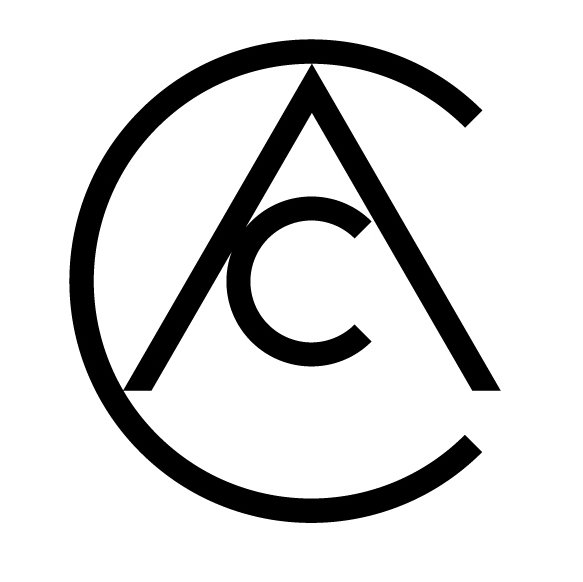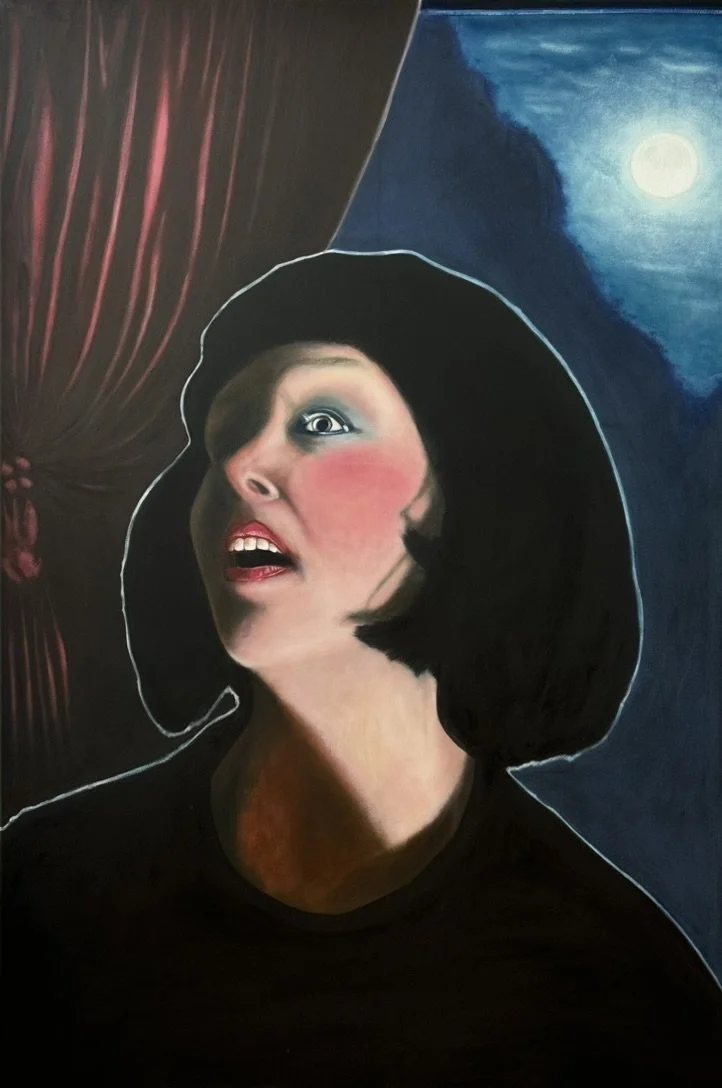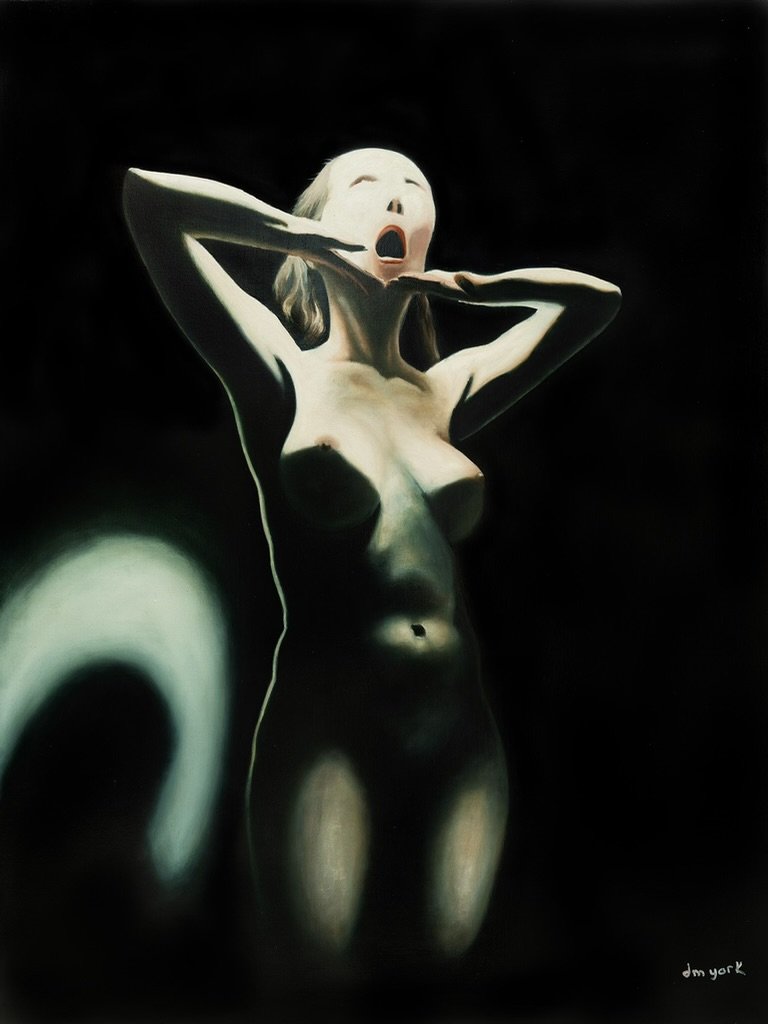Interview with Daniel Matthew York
Your new collection, "Delusionism," seems to be a radical departure from traditional art forms. Can you elaborate on what "Delusionism" means to you, how it evolved over time, and what you hope to communicate through this body of work? How does it challenge the conventional perceptions of reality and identity in contemporary art?
Sure, well, first I don't know that I would call it a “radical departure from traditional art forms” rather than a modern continuation of them. Traditional art from the old Masters is my biggest influence.
Delusionism was a word I’d coined some years ago. I was looking for a word that would really embody what impact I am creating and what I wanted to challenge my viewers with. To delude means to deceive or fool or to impose a misleading belief onto someone. I feel that this is how people live their entire lives. Never exposing their true self to others, maybe even to themselves. They create a façade, or many, and live a life of quiet desperation or fear or secret hatred all while putting out this delusion of happiness or sanity, or stability. If I am challenging anything, that's it. Funnily enough, delusionism actually started off being more like a ridiculous glaring comedy art, which I still love, and some of my old pieces are very ugly, but as a body of work always does, it evolved into what I'm doing now.
You have cited a diverse range of influences from classical masters like Titian and Caravaggio to contemporary figures like Lisa Yuskavage. How have these influences shaped your artistic voice? Can you discuss specific elements from these artists that you’ve integrated into your own work and how they manifest in your latest collection?
I think the influential aspects about those you’re citing is that they’re very much themselves. I respect that so much. They have found themselves in their work in that it’s so highly individualized, you can tell any piece is theirs from a mile away. It’s their artistic face and is as recognizable as a person’s own face. You could say in more marketable terms, they are "brand-able" but I think that steals their luster and reduces what they’ve created down to a PR blurb. They’re stars for a reason. I think, like them, that I’ve found my own individualization, though. I could pick my stuff out of a crowd.
With the increasing prevalence of AI in the art world, there’s a growing debate about the role of human creativity versus machine-generated art. How do you perceive the impact of AI on the art market? Do you see it as a tool that can enhance creativity, or as a threat that dilutes the value of human-made art?
I think that will depend on the type of artist. If you're a web designer or graphic designer, AI could be a huge benefit. It's going to speed things up dramatically and reduce costs, things like that. I certainly don't see it as a threat. It's going to impact every artistic market, no doubt, but one thing will remain constant in all art markets, including fine art, is everybody “loves a star.” They are cool. Mick Jagger is cool. David Bowie was cool. Warhol was cool. AI, likely won’t ever achieve that “cool” status. There’s no person to tie it to. Maybe one day we’ll see a VR AI star or something, but no one wants to go to a concert starred by a bunch of laptops on a stage or a video screen with an Avatar person. I don't see real collectors jumping at the opportunity to pay millions for art made by AI and go auction it off at Sotheby's for millions in profits or anything like that. Even Beeple, using modern tech and NFTs is still a person behind the creativity.
On top of that, there’s a life and energy that an artist puts into a work that cannot be replicated by a computer, no matter how smart it is. If you go to the Louvre and look at any piece by any of the old Masters, some of them literally take your breath away, and that’s not just technique or color theory, that was life directly injected by the artist, and I don't think a computer will ever be able to do that. That's life, injected. Go look at one of Monet’s Cathedral paintings, it flows out at you like water, real live energy. Good luck getting any AI to replicate that.
The concept of identity and the self is central to your work, particularly in "Delusionism," where you explore the facade and ambiguity of human expression. How do you think the digital age, with its emphasis on virtual identities and personas, intersects with the themes of your art? Are we, as a society, becoming more ‘delusional’ in the way we perceive ourselves and others?
Yes, absolutely, we live in a live movie full of characters and actors, and some of them are really bad, too. It's probably always been like that, but it’s now exacerbated by the endless and self-driven media channels like Youtube and TikTok which now reach into some very remote areas of the world. So now even Tibetan mountain children have opportunities to be tainted by the delusional personalities that clog the digital world. What’s real anymore? Politics is a game show. Your Instagram algorithm is “programmed” to your “preferences.” The mainstream news is as real as the Muppet Show, and far less entertaining. If you really dig in though, and get to know the people who consume it all and get past all of their social media trained characters and opinions, they’re still in there. The new personal commodity in the future will be, being genuine.
As an artist working in a time when NFTs, cryptocurrencies, and digital art are becoming increasingly dominant, how do you envision the future relationship between traditional art forms and these new technologies? Do you see them as conflicting forces, or is there potential for a harmonious coexistence?
I think they will form a harmonious existence for sure. We've already seen a lot of rapid changes since Covid. If I was going to predict where it ends up, I probably see the most harmonious existence in art being that you will probably use NFT's as proof of purchasing, contracts, or a basis for things like licensing and ownership documentation; cryptocurrency will just be the medium with which to buy it. Crypto, whether it remains decentralized, or gets centralized by governments, I think is the inevitable future of currency. One way or the other though, I do think art, crypto and NFT’s will join together, and harmoniously.
As far as NFT as its own digital art form? With digital billboards and digital canvases in people’s homes and digital picture books, maybe it will surpass the tangible fine art market? I don't know. But if we look at wrist watches in the 80’s up until now the real collectors don't want a cheap quartz digital watch, even though that is the most exact time keeping technology extant. They want a fine “timepiece” with engraved parts and hand guilloched faces - a true work of art from a real, live artisan. Even though Kindles and e-readers have created a lot of convenience, there's an entire culture forming around the collection of books. Real books are cool. Digital books are just convenient. Same with vinyl records. I know people whose pride and joy is an entire wall of vinyl records, even though you can fit your entire music collection in your iPhone. There will always be that kind of market, no matter what technology comes out.
Given the flood of AI-generated art in the market, what advice would you give to emerging artists who are trying to carve out a space for themselves? How can artists protect their unique creative voices and maintain the authenticity of their work in a landscape that’s rapidly changing due to technological advances?
Ignore it. I wouldn't worry about it at all. One thing that you're not gonna get away from is the fact that AI is going to scrape every single image on the planet faster than any national or international regulatory body will be able to protect it. But, it will scrape your images (and everyone else’s) and conglomerate them into a mishmash that might look cool for somebody's storybook which they're trying to produce inexpensively for their latest Amazon published book, but it won't be you. And it won’t have the same life in it. Sure, they could give AI a prompt to produce art like you, but it still won't be you, and it won't have the live artist’s embodiment of what I was referring to earlier. So my advice? Fuck all that noise. Find your audience and your people and get your work to them. If they’re real art fans, I’m sure they’d rather have the real deal than a knock off. There’s a reason some steel Rolex’s costs 2X their list price, like $30k, and a Chinese knock-off Rolex can be bought in NYC for $50.00. Who is your audience?
In your biography, you mention the struggle of trying to force your style before finally allowing your natural artistic expression to emerge. Can you discuss the importance of authenticity in an artist's journey and how you came to accept and embrace your unique voice? How does this personal evolution reflect in your "Delusionism" collection?
I think that's really the difference between me working to try to be like someone else and just “doing it.” Just like everyone else, when I was younger, I had all of my artistic influences, some of whom were comic book artists like Simon Bisley. And if you look at what I used to draw in high school it kind of looks like Simon Bisley. But as I traveled down that road, I typically got more and more unhappy with my work. I’d start over-thinking it and producing shit. Now I just work. I don't really think about it, I just do it and it comes out a certain way. And that “certain way” surprises even me. Do that enough times and all of a sudden you find that you have your own style. And it tends to come through in every single piece of work you do. Delusionism is that, now for me. Maybe it’s darker or more perverse or less colorful than my Mom or friends or associates would’ve wanted it to be, but it’s how it came out. I love it.
Art collectors play a significant role in shaping the art market, and their behaviors are influenced by emerging trends and technologies like AI and NFTs. How do you think these shifts will affect the relationship between artists and collectors in the future? What are the potential risks and rewards for artists in navigating this new landscape?
I do think it’s very worthwhile for all artists, galleries and collectors to stay on top of all of the technology. You don’t want to be the guy who makes wagon wheels when everybody is driving flying cars. I think there will always be a beneficial relationship between the artists, galleries, art dealers, collectors, and the auction houses. Back when MP3’s came out everybody thought that the consumer was going to go straight to the artist. Or steal it with Napster. But the artist still ran into the same problems: the labels had the power, expertise and money to solve problems, had the exposure, and the business acumen. After all, ask most artists what they want to do? Do they want to be business people doing sales and marketing and PR’ing and bookkeeping? Or do they want to paint?
Your work often delves into the complexities of human emotions, hidden facets, and the absurdities of existence. How do you approach capturing these intricate layers of human experience in your art? In the context of "Delusionism," what are you trying to convey about the human condition, and how do you think viewers should engage with your work?
In person is always the best way to engage with my work. That was my most hated part of the Covid lockdowns. You're gonna go look at art on a computer screen? Or even worse, a phone? It's a travesty. I watched my first live rock concert stream from my laptop screen watching it in bed. It sucked.
As far as the human condition, I'm just conveying that there's another layer to whatever everyone sees. It's there, it's not always pretty, but it's real and it's true.
Looking at the trajectory of your career, from being influenced by the grand masters to developing your own distinctive style, what do you see as the next evolution in your art? How do you plan to continue challenging both yourself and your audience in an art world increasingly shaped by technological advancements and shifting cultural norms?
I love oils and I love a good old canvas, I don't see that changing. Who knows where my style will go though?
The current goal I’m working on is to convey more depth into each piece than ever before. I feel that so many artists get caught up in the technical achievements of art that they forget it is a communication form, first. I want to imbue each work with more meaning that people will appreciate 500 years from now, like the old masters have done.
Insta: @danielmatthewyork






